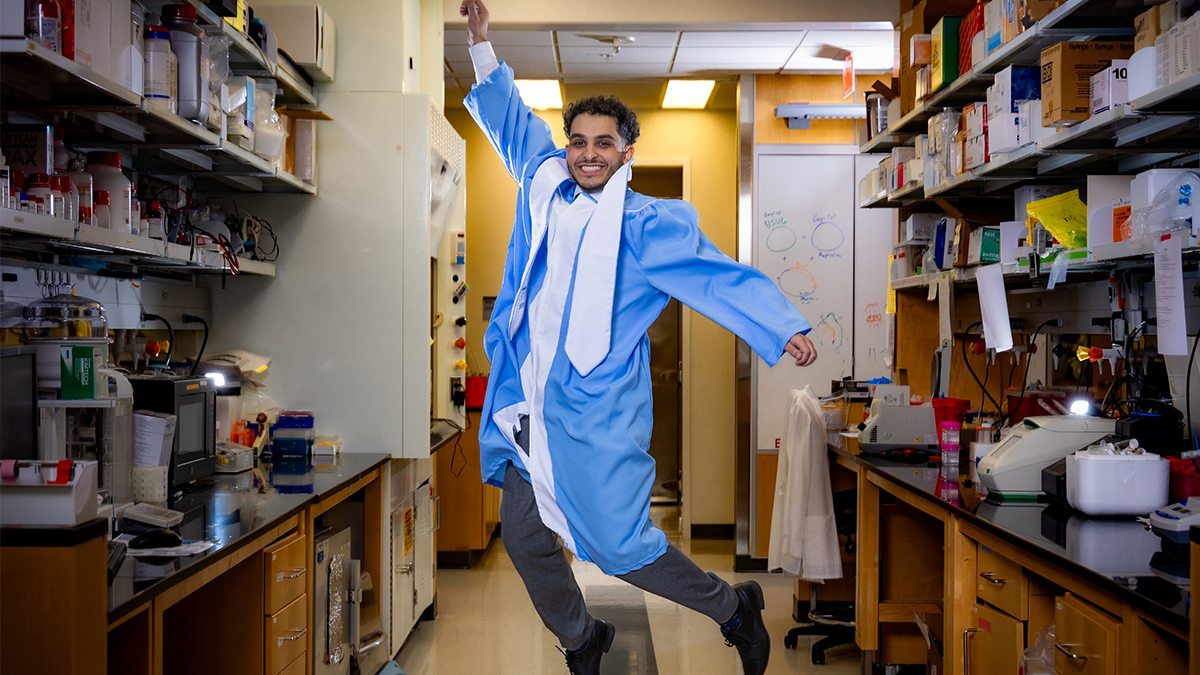Public health senior studies brain cancer treatments
Rami Darawsheh affirmed his interest in medicine working with researchers in the schools of medicine and pharmacy.

Participation in research has shaped the college careers of many graduating Tar Heels.
Rami Darawsheh is one of them.
Before coming to Carolina, Darawsheh thought research was repetitive and closed off — an activity where people didn’t work together. But he soon realized this was not the case.
“I was surprised how collaborative research is. Everyone works together and is willing to help you,” says Darawsheh, who majored in health policy and management in the UNC Gillings School of Global Public Health.
As a first-year student, Darawsheh knew he was interested in studying medicine, but he wanted to use his time at college to reaffirm this interest and explore adjacent fields.
In 2022, he joined the Hingtgen Lab, led by Shawn Hingtgen, professor in UNC School of Medicine and the UNC Eshelman School of Pharmacy. The lab’s research focuses on developing more effective drugs to treat brain cancer. This includes using a brain-slice model and developing a scoring system based on how effective the drugs are at killing the tumors and how harmful they might be to the brain.
The typical standard of care for brain cancer is to treat the tumor with a specific drug based on what type of genetic mutation the biopsy shows. But biopsies may not represent the entire tumor, making it difficult to determine which drug might be most effective in targeting and killing the cancer cells.
With the brain-slice model, researchers can use a cell line from a patient’s cancer to test a drug and then watch how it reacts.
“They had a library of 10-plus drugs. Some of them were still undergoing clinical trials and a lot of them were new-generation, targeted therapies — things that I have never even heard of before,” Darawsheh says. “It was an exciting opportunity.”
Darawsheh also worked with Colette Shen’s group in the UNC School of Medicine’s radiation oncology department, using electronic health records to uncover when patients received a certain treatment and documenting whether they had follow-up appointments.
This information helps clinicians optimize their standard of care by providing insights into how patient statuses change over time. It can also determine if treatments should be reevaluated or removed.
Through his work in the radiation oncology department, Darawsheh developed the idea for his honors thesis: a retrospective analysis of neurological outcomes for patients who have had whole-brain radiation. While this can be an effective treatment for getting rid of the cancer cells, it can also leave patients with negative, long-term neurological outcomes and poor quality of life.
Darawsheh hopes his project will provide insight into how these patients’ neurological statuses change over time and will help other researchers evaluate the effectiveness of this treatment.
“These kinds of projects are super interesting to me because I get to do a deep dive on the patient’s history and understand what happened to them throughout their treatment,” he says. “I feel like I’m able to make a difference.”
Before starting medical school at the University of California San Francisco this fall, Darawsheh plans to travel to Jordan on the Phillips Travel Scholarship. He’ll gain insight on how the health care system there is handling the refugee crisis and addressing health care disparities within its population.
“I feel like everything I’ve learned at Carolina translates to research,” he says. “It translates to what I want to do in medicine and adjacent to medicine, whether that’s working in policy, continuing to do research or working with practice-based, public health initiatives.”







